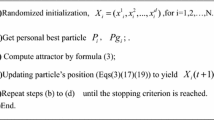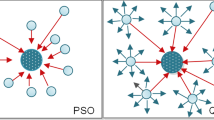Abstract
The concept of computational optimization can be used to solve linear and nonlinear Diophantine equations. The goal of this article is to introduce an alternative technique, which is independent of greatest common divisor (g.c.d), to solve linear and nonlinear Diophantine equations by transforming the equations into discrete variable bound constrained optimization problems. To solve these optimization problems, weighted quantum-behaved particle swarm optimization (WQPSO) is developed into discrete variable form. Then, four linear and four nonlinear Diophantine equations are considered from recent literature and solved by using the discrete WQPSO algorithm. Next, the convergence histories of each of the problems are shown. Finally, the results are compared with the same reported by numerous researchers.








Similar content being viewed by others
Explore related subjects
Discover the latest articles, news and stories from top researchers in related subjects.Data availability
In this paper, no data have to use from any source.
References
Abo-Hammour Z, Albadarneh R, Saraireh MS (2010) Solution of Laplace equation using continuous genetic algorithms. Kuwait J Sci Eng 37(2A):1–15
Abraham S, Sanyal S, Sanglikar M (2010) Particle swarm optimisation based Diophantine equation solver. Int J Bio-Inspir Comput 2(2):100–114
Agushak JO, Ezugwu AE, Abualigah L (2022) Dwarf mongoose optimization algorithm. Comput Methods Appl Mech Eng 391:114570
Ahmadianfar I, Heidari AA, Gandomi AH, Chu X, Chen H (2021) RUN beyond the metaphor: an efficient optimization algorithm based on Runge Kutta method. Expert Syst Appl 181:115079
Burton DM (2010) Elementary number theory. The McGraw-Hill Companies, Inc., New York
Dehghani M, Hubálovský Š, Trojovský P (2022) Tasmanian devil optimization: a new bio-inspired optimization algorithm for solving optimization algorithm. IEEE Access 10:19599–19620
Dorigo M, Birattari M, Stutzle T (2006) Ant colony optimization. IEEE Comput Intell Mag 1(4):28–39
Eberhart R, Kennedy J (1995) A new optimizer using particle swarm theory. In: MHS’95. Proceedings of the sixth international symposium on micro machine and human science. IEEE, New Jersey, pp 39–43
Erdoğmuş P (2018) A new solution approach for non-linear equation systems with grey wolf optimizer. Sakarya Univ J Comput Inf Sci 1(3):1–11
Fatimah BO, Senapon WA, Adebowale AM (2015) Solving ordinary differential equations with evolutionary algorithms. Open J Optim 4(03):69
Gandomi AH, Alavi AH (2012) Krill herd: a new bio-inspired optimization algorithm. Commun Nonlinear Sci Numer Simul 17(12):4831–4845
Goldberg DE (2006) Genetic algorithms. Pearson Education, India
Hansen P, Mladenovic N, Perez JAM (2010) Variable neighbourhood search: methods and applications. Ann Oper Res 175(1):367–407
Heidari AA, Mirjalili S, Faris H, Aljarah I, Mafarja M, Chen H (2019) Harris hawks optimization: algorithm and applications. Future Gener Comput Syst 97:849–872
Holland JH (1992) Adaptation in natural and artificial systems: an introductory analysis with applications to biology, control, and artificial intelligence. MIT press, Cambridge
Hooke R, Jeeves TA (1961) “Direct search” solution of numerical and statistical problems. J ACM (JACM) 8(2):212–229
Imomov A, Khodjaev YT (2020) On some methods for solution of linear Diophantine equations. Univ J Math Appl 3(2):86–92
Jebari K, Madiafi M, Moujahid AE (2013) Solving poisson equation by genetic algorithms. Int J Comput Appl 83(5):1–6
Karaboga D, Basturk B (2007) A powerful and efficient algorithm for numerical function optimization: artificial bee colony (ABC) algorithm. J Global Optim 39(3):459–471
Kirkpatrick S, Gelatt CD, Vecchi MP (1983) Optimization by simulated annealing. Science 220:671–680
Kumar S, Gupta S, Kishan H (2018) On the non-linear Diophantine equation 61x + 67y = z 2 and 67 x + 73y = z 2. Ann Pure Appl Math 18(1):91–94
Kumar N, Shaikh AA, Mahato SK, Bhunia AK (2021a) Applications of new hybrid algorithm based on advanced cuckoo search and adaptive Gaussian quantum behaved particle swarm optimization in solving ordinary differential equations. Expert Syst Appl 172:114646
Kumar N, Shaikh AA, Mahato SK, Bhunia AK (2021b) Development of some techniques for solving system of linear and nonlinear equations via hybrid algorithm. Expert Syst 38(3):e12669
Lewis RM, Torczon V, Trosset MW (2000) Direct search methods: then and now. J Comput Appl Math 124(1–2):191–207
Li S, Chen H, Wang M, Heidari AA, Mirjalili S (2020) Slime mould algorithm: a new method for stochastic optimization. Future Gener Comput Syst 111:300–323
Liashchynskyi P, Liashchynskyi P (2019) Grid search, random search, genetic algorithm: a big comparison for NAS. arXiv preprint arXiv:1912.06059
Lourenco HR, Martin OC, Stutzle T (2019) Iterated local search: framework and applications. In: Gendreau M, Potvin JY (eds) Handbook of metaheuristics. Springer, Berlin, pp 129–168
Lukemire J, Mandal A, Wong WK (2019) d-QPSO: a quantum-behaved particle swarm technique for finding d-optimal designs with discrete and continuous factors and a binary response. Technometrics 61(1):77–87
Mafteiu-Scai LO, Mafteiu-Scai EJ (2013) Solving linear systems of equations using a memetic algorithm. Int J Comput Appl 975:8887
Man YK (2020) A forward approach for solving linear Diophantine equation. Int J Math Educ Sci Technol 51(8):1284–1288. https://doi.org/10.1080/0020739X.2020.1745915
Mirjalili S, Mirjalili SM, Lewis A (2014) Grey wolf optimizer. Adv Eng Softw 69:46–61
Mo Y, Liu H, Wang Q (2009) Conjugate direction particle swarm optimization solving systems of nonlinear equations. Comput Math Appl 57(11–12):1877–1882
Nelder JA, Mead R (1965) A simplex method for function minimization. Comput J 7(4):308–313
Pourrajabian A, Ebrahimi R, Mirzaei M, Shams M (2013) Applying genetic algorithms for solving nonlinear algebraic equations. Appl Math Comput 219(24):11483–11494
Rashedi E, Nezamabadi-Pour H, Saryazdi S (2009) GSA: a gravitational search algorithm. Inf Sci 179(13):2232–2248
Sadollah A, Eskandar H, Kim JH (2015) Approximate solving of nonlinear ordinary differential equations using least square weight function and metaheuristic algorithms. Eng Appl Artif Intell 40:117–132
Storn R, Price K (1997) Differential evolution–a simple and efficient heuristic for global optimization over continuous spaces. J Global Optim 11(4):341–359
Sun J, Fang W, Wu X, Palade V, Xu W (2012) Quantum-behaved particle swarm optimization: analysis of individual particle behavior and parameter selection. Evol Comput 20:349–393
Sun J, Feng B, Xu W (2004) Particle swarm optimization with particles having quantum behavior. In: Proceedings of the 2004 congress on evolutionary computation (IEEE Cat. No. 04TH8753), vol 1. IEEE, New Jersey, pp 325–331
Tu J, Chen H, Wang M, Gandomi AH (2021) The colony predation algorithm. J Bionic Eng 18(3):674–710
Turgut OE, Turgut MS, Coban MT (2014) Chaotic quantum behaved particle swarm optimization algorithm for solving nonlinear system of equations. Comput Math Appl 68(4):508–530
Wang GG, Deb S, Coelho LDS (2018) Earthworm optimisation algorithm: a bio-inspired metaheuristic algorithm for global optimisation problems. Int J Bio-Inspir Comput 12(1):1–22
Wang GG, Deb S, Cui Z (2019) Monarch butterfly optimization. Neural Comput Appl 31(7):1995–2014
Wang GG, Deb S, Coelho LDS (2015) Elephant herding optimization. In: 2015 3rd international symposium on computational and business intelligence (ISCBI). IEEE, New Jersey, pp 1–5
Xi M, Sun J, Xu W (2008) An improved quantum-behaved particle swarm optimization algorithm with weighted mean best position. Appl Math Comput 205(2):751–759
Yang XS (2020) Nature-inspired optimization algorithms. Academic Press, Cambridge
Yang Y, Chen H, Heidari AA, Gandomi AH (2021) Hunger games search: Visions, conception, implementation, deep analysis, perspectives, and towards performance shifts. Expert Syst Appl 177:114864
Yang XS, Deb S (2009) Cuckoo search via Lévy flights. In: 2009 World congress on nature & biologically inspired computing (NaBIC). IEEE, New Jersey, pp 210–214. https://doi.org/10.1109/NABIC.2009.5393690
Zhang J, Song W, Jiang B et al (2018) Measurement of lumber moisture content based on PCA and GS-SVM. J for Res 29(2):1–8
Zuckerman N (1980) An introduction to the theory of numbers, 3rd edn. Wiley Publication, Hoboken
Acknowledgements
Author is thankful to the Editor and the anonymous Reviewers for giving their valuable comments and suggestions for improving the quality of this work.
Funding
The authors has not disclosed any funding.
Author information
Authors and Affiliations
Corresponding author
Ethics declarations
Conflict of interest
The authors has not disclosed any competing interests.
Ethical approval
No animals are involved to carry out this research.
Additional information
Publisher's Note
Springer Nature remains neutral with regard to jurisdictional claims in published maps and institutional affiliations.
Rights and permissions
About this article
Cite this article
Kumar, N. An alternative computational optimization technique to solve linear and nonlinear Diophantine equations using discrete WQPSO algorithm. Soft Comput 26, 12531–12544 (2022). https://doi.org/10.1007/s00500-022-07199-1
Accepted:
Published:
Issue Date:
DOI: https://doi.org/10.1007/s00500-022-07199-1




